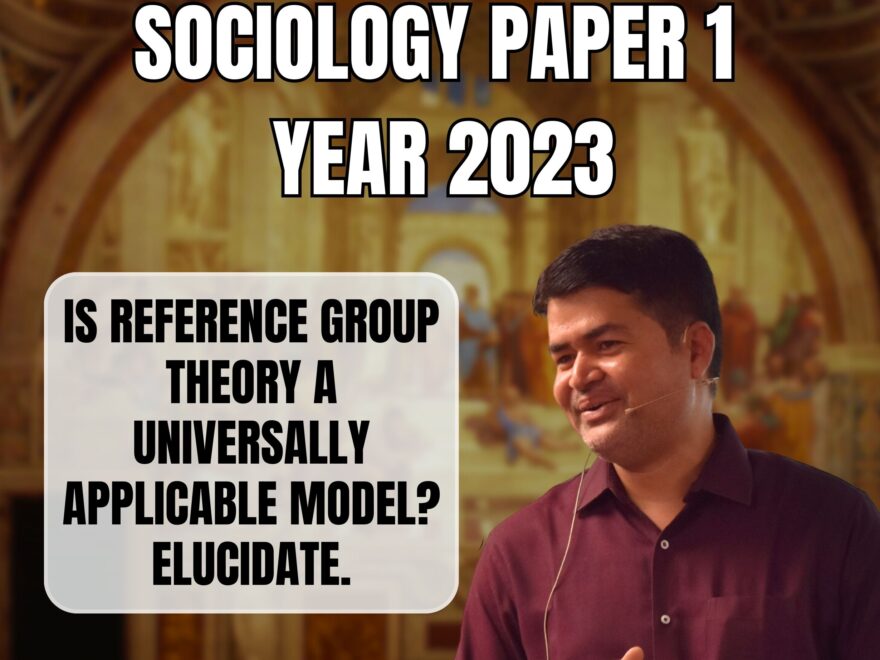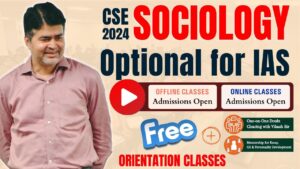Is reference group theory a universally applicable model? Elucidate.
Section: A
Sociology Paper 2023 Analysis
(Relevant Paper 1: Unit-4 Sociological Thinkers)
Question: 1 (D) Is reference group theory a universally applicable model? Elucidate.
(10 Marks)
|
Introduction: Discuss in Brief the Background of Reference Group Theory by R K Merton Main Body: Explain the Application of Reference Group Theory , Explain the Non -Universality of Theory With Illustrations Conclusion: On the Lines of Middle Range Theory |
Introduction:
R. K. Merton build on the reference group theory on the basis of Samuel Stouffer’s findings that soldiers’ feelings of relative deprivation were more related to the living standards of the groups they compared themselves to than their actual hardships.
Main body:
- Reference group refers to group to which the individuals refer to evaluate their status, role performance, ambitions, achievement. Individuals belong to multiple groups in society. The group to which individual belong referred as membership group, the group to which individuals does not belong to referred as non-membership group. People generally consider the non- membership groups as reference group , they feel relatively deprived and goes for anticipatory socialization .and depending upon whether the reference group is open or closed anticipatory socialization leads to mobility or marginalisation respectively .
Application of reference group model
- The reference group theory helps us to understand in detail the society in context of its openness and closeness and hence the scope of mobility in society can be understood.
- For example Louis Dumont has referred the Indian society as homo hierarchicus and called Indian caste system as closed. Whereas the concept of Sanskritization given by M N Srinivas used reference group theory to explain the chances of mobility in closed society.
- Reference group theory provides the mechanisms of mobility and growth in society. It can help providing aspirations to people to go for anticipatory socialization and achieve mobility.
- Reference groups contribute to individuals’ socialization processes and help shape their identities. By comparing themselves to their reference groups, individuals develop a sense of self and learn appropriate behaviours, values, and norms.
- Reference groups can also influence individuals to engage in deviant or delinquent behaviour. Understanding the dynamics of reference groups can help in developing interventions and programs to prevent or address such behaviours.
- Reference group theory is applied in the field of information studies to understand how individuals seek, evaluate, and use information based on the standards and norms of their reference group. This understanding can help in designing more effective information services and resources.
Reference group theory: not universally applicable
Reference group theory is not universally applicable but it’s relevance is limited in its scope depending upon various contexts
- Variability in individuals’ psychological and social traits has a significant impact on how they engage with reference groups. The extent to which reference groups influence individuals varies based on their personality, values, and life experiences. This diversity among individuals challenges the universality of reference group theory.
- The reference group theory can- not be applied in terms of people who does not feel relative deprivation or the societies which are isolated. For example the isolated tribes in many areas are not even aware about the non- membership groups due to limited or no interaction.
- The application of reference theory becomes limited in application if resources are not well placed for anticipatory socialization. In such scenarios the relative deprivation does not conclude in anticipatory socialization. The theory of culture of poverty by Oscar Lewis explain such behaviour where anticipatory socialization is not applicable.
- Even the concept of Sanskritization as anticipatory socialization is limited in its scope and it is criticised for the same reason .
Conclusion:
Merton himself gave the concept of middle range theories and rejected the universal aspect of classical functionalism and shifted the paradigm towards limited application of any concept or theory. The relevance and impact of reference groups is also context-dependent. The theory’s applicability may differ depending on the specific situation or decisions being considered.
Related Blogs…
To master these intricacies and fare well in the Sociology Optional Syllabus, aspiring sociologists might benefit from guidance by the Best Sociology Optional Teacher and participation in the Best Sociology Optional Coaching. These avenues provide comprehensive assistance, ensuring a solid understanding of sociology’s diverse methodologies and techniques.
META TAGS:
Reference Group Theory, Sociological Theories, Relative Deprivation, R.K. Merton, Anticipatory Socialization, Social Mobility, Homo Hierarchicus, Sanskritization, Culture of Poverty, Social Structure, Social Identity, Behavioral Influence, Social Influence, Psychological Traits, Social Traits, Membership Group, Non-membership Group, Socialization, Social Dynamics, Middle Range Theory, Societal Openness, Social Interventions, Deviant Behavior, Information Studies, Social Comparison, Social Norms, Social Values, Individual Behaviors.
Why Vikash Ranjan’s Classes for Sociology?
Proper guidance and assistance are required to learn the skill of interlinking current happenings with the conventional topics. VIKASH RANJAN SIR at TRIUMPH IAS guides students according to the Recent Trends of UPSC, making him the Best Sociology Teacher for Sociology Optional UPSC.
At Triumph IAS, the Best Sociology Optional Coaching platform, we not only provide the best study material and applied classes for Sociology for IAS but also conduct regular assignments and class tests to assess candidates’ writing skills and understanding of the subject.
Choose The Best Sociology Optional Teacher for IAS Preparation?
At the beginning of the journey for Civil Services Examination preparation, many students face a pivotal decision – selecting their optional subject. Questions such as “which optional subject is the best?” and “which optional subject is the most scoring?” frequently come to mind. Choosing the right optional subject, like choosing the best sociology optional teacher, is a subjective yet vital step that requires a thoughtful decision based on facts. A misstep in this crucial decision can indeed prove disastrous.
Ever since the exam pattern was revamped in 2013, the UPSC has eliminated the need for a second optional subject. Now, candidates have to choose only one optional subject for the UPSC Mains, which has two papers of 250 marks each. One of the compelling choices for many has been the sociology optional. However, it’s strongly advised to decide on your optional subject for mains well ahead of time to get sufficient time to complete the syllabus. After all, most students score similarly in General Studies Papers; it’s the score in the optional subject & essay that contributes significantly to the final selection.
“A sound strategy does not rely solely on the popular
Opinion of toppers or famous YouTubers cum teachers.”
It requires understanding one’s ability, interest, and the relevance of the subject, not just for the exam but also for life in general. Hence, when selecting the best sociology teacher, one must consider the usefulness of sociology optional coaching in General Studies, Essay, and Personality Test.
The choice of the optional subject should be based on objective criteria, such as the nature, scope, and size of the syllabus, uniformity and stability in the question pattern, relevance of the syllabic content in daily life in society, and the availability of study material and guidance. For example, choosing the best sociology optional coaching can ensure access to top-quality study materials and experienced teachers. Always remember, the approach of the UPSC optional subject differs from your academic studies of subjects. Therefore, before settling for sociology optional, you need to analyze the syllabus, previous years’ pattern, subject requirements (be it ideal, visionary, numerical, conceptual theoretical), and your comfort level with the subject.
This decision marks a critical point in your UPSC – CSE journey, potentially determining your success in a career in IAS/Civil Services. Therefore, it’s crucial to choose wisely, whether it’s the optional subject or the best sociology optional teacher. Always base your decision on accurate facts, and never let your emotional biases guide your choices. After all, the search for the best sociology optional coaching is about finding the perfect fit for your unique academic needs and aspirations.
Follow us :
🔎 https://www.instagram.com/triumphias
🔎 https://www.youtube.com/c/TriumphIAS
🔎 https://t.me/VikashRanjanSociology
Find More Blogs…
| Compare and contrast Karl Marx’s and Max weber’s | Karl Marx- Historical Materialism |
| Position of Women In the Modern Indian Society | Sociology: Social system and pattern variables |



One comment